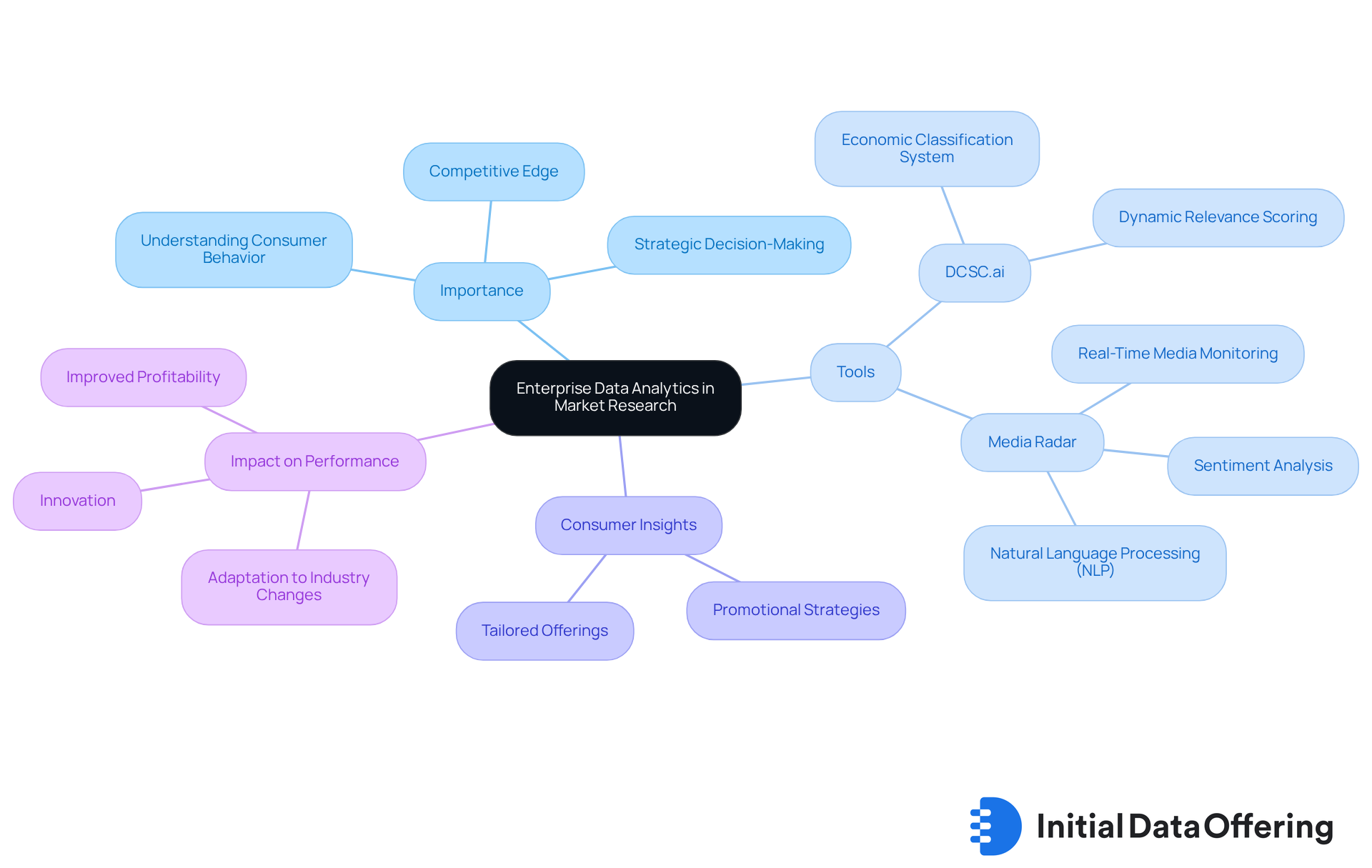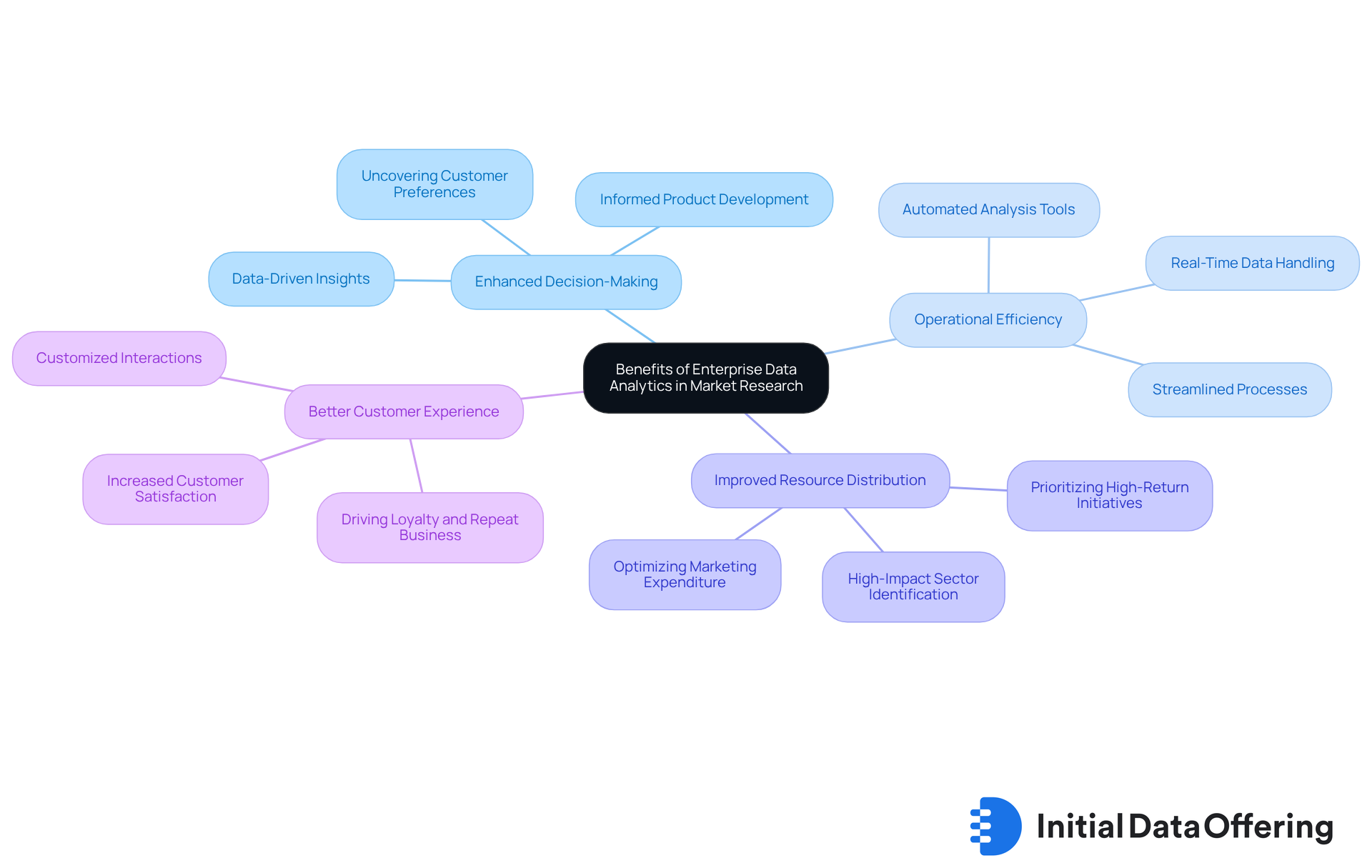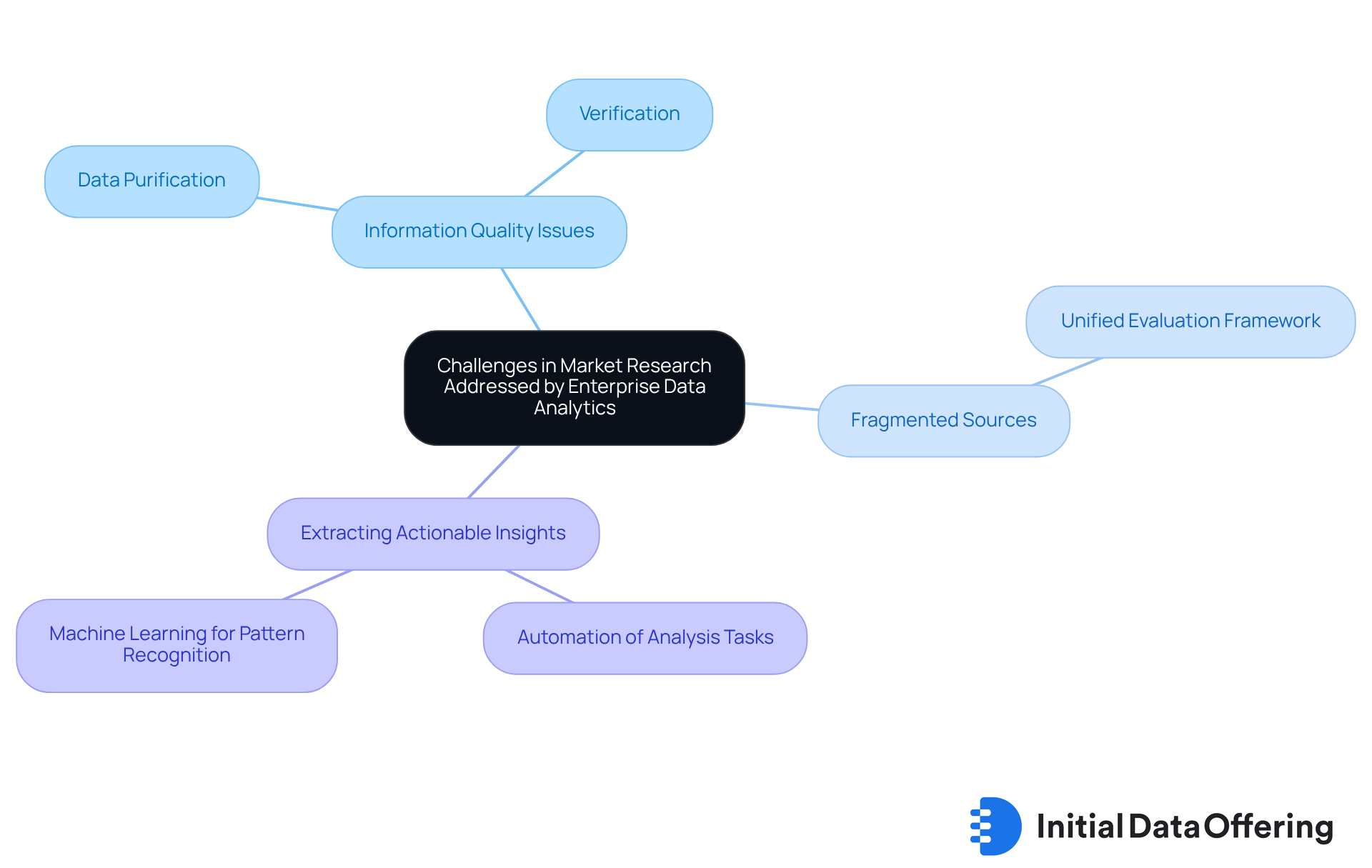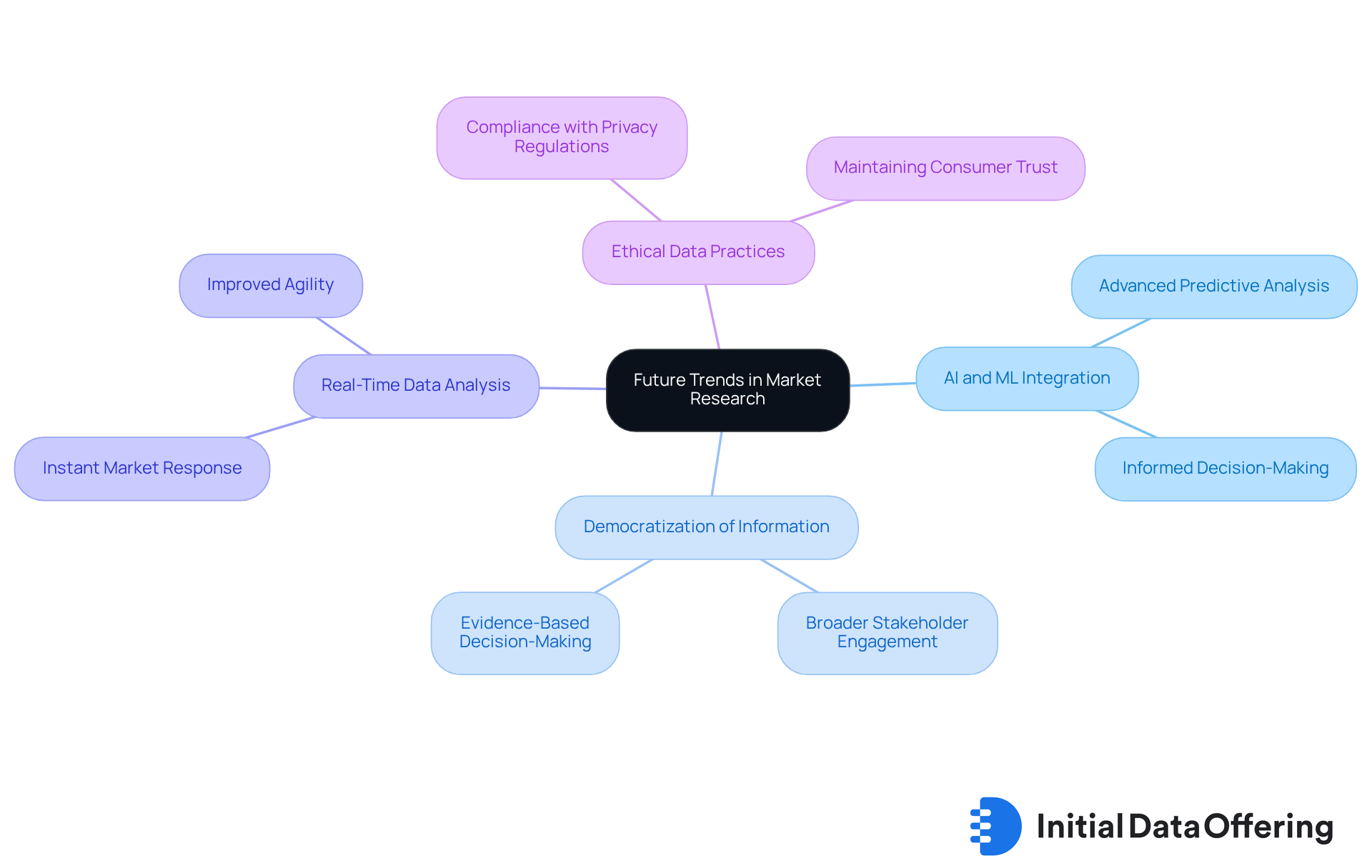Why Enterprise Data Analytics Matters for Market Research Analysts

Why Enterprise Data Analytics Matters for Market Research Analysts
Overview
Enterprise data analytics serves as a crucial tool for market research analysts, enabling them to extract actionable insights from extensive datasets. This capability enhances decision-making and operational efficiency, allowing analysts to navigate complex market dynamics effectively. By leveraging advanced analytics tools, analysts can identify consumer trends, which significantly improves marketing strategies.
The advantages of employing these analytics tools are manifold. First, they provide analysts with the ability to interpret large volumes of data swiftly, leading to informed decisions that can drive business success. Additionally, the insights gained can lead to improved performance metrics, giving organizations a competitive edge in a challenging marketplace.
Ultimately, the benefits of utilizing enterprise data analytics extend beyond mere data interpretation. Analysts who harness these insights can develop more effective marketing strategies, which not only resonate with consumers but also enhance overall business outcomes.
How might these insights influence your approach to market research? Consider the implications of data-driven decision-making in your own work.
Introduction
In an age where data flows in from every direction, the ability to harness and analyze this information has become a game-changer for market research analysts.
Enterprise data analytics offers organizations the capability to draw meaningful insights from vast datasets, enhancing decision-making processes that can shape strategic directions.
This not only empowers companies to navigate the complexities of their environments but also positions them to respond effectively to rapid market changes.
Yet, as they strive to keep pace with these shifts, a critical question emerges: how can they effectively leverage analytical tools to overcome challenges and seize opportunities in an increasingly competitive landscape?
Establish the Importance of Enterprise Data Analytics in Market Research
Enterprise data analytics plays a crucial role in industry exploration, enabling organizations to harness extensive volumes of information for significant insights. In today’s data-driven environment, companies face an overwhelming influx of information from diverse origins, such as customer interactions, industry trends, and competitive dynamics, highlighting the importance of enterprise data analytics. By leveraging enterprise data analytics, market evaluation specialists can examine business information to identify patterns, correlations, and trends that inform strategic decisions. This capability is essential for maintaining a competitive edge in an increasingly complex marketplace.
Businesses that engage in information analysis gain a deeper understanding of consumer behaviors, allowing them to tailor their offerings and promotional strategies effectively. A prime example of this is the innovative economic classification system developed by DCSC.ai. This system utilizes AI and Big Data to provide dynamic relevance scoring that connects companies to multiple sectors. Such scoring illustrates the intricacy of the contemporary economy and empowers analysts to create sector-themed portfolios and categorize their studies efficiently.
Moreover, tools like Media Radar enhance this process by offering advanced real-time media monitoring and sentiment analysis. By harnessing natural language processing (NLP), these tools deliver actionable insights. As highlighted in numerous studies, organizations that prioritize enterprise data analytics are more likely to innovate and adapt to shifting industry circumstances, ultimately leading to improved performance and profitability.
How can your organization leverage information analysis to stay ahead in this rapidly evolving landscape?

Explore the Benefits of Enterprise Data Analytics for Market Research
The advantages of enterprise data analytics in market research are numerous. Firstly, enterprise data analytics enhances decision-making capabilities by offering data-driven insights that reduce reliance on intuition. For instance, enterprise data analytics can uncover customer preferences and emerging trends, enabling companies to make informed product development and marketing choices. Secondly, it enhances operational efficiency by streamlining enterprise data analytics and the processes of information collection and analysis. Automated analysis tools in enterprise data analytics can handle large datasets in real-time, enabling analysts to concentrate on interpreting results instead of information collection.
Moreover, enterprise data analytics facilitates improved resource distribution by pinpointing high-impact sectors for investment. Companies can prioritize initiatives that yield the highest returns based on enterprise data analytics, thereby optimizing their marketing expenditure. Furthermore, organizations that utilize enterprise data analytics can improve customer experiences by customizing interactions based on insights obtained from consumer behavior information. This tailored approach not only increases customer satisfaction but also drives loyalty and repeat business.
How can your organization leverage these insights to enhance its market strategies?

Address Challenges in Market Research with Enterprise Data Analytics
Market research presents numerous challenges, such as issues with information quality, fragmented sources, and the difficulty of extracting actionable insights from extensive datasets. Enterprise data analytics addresses these challenges head-on. For instance, inconsistencies and errors often undermine information quality; however, sophisticated analytical tools can purify and verify data, ensuring that analysts work with reliable content.
Moreover, integrating various information sources into a unified evaluation framework provides a more comprehensive view of market dynamics. This integration is crucial for identifying trends that may not be apparent when analyzing data in isolation. Additionally, enterprise data analytics allows organizations to automate routine analysis tasks, freeing analysts to focus on strategic insights rather than tedious processing.
By leveraging machine learning algorithms, businesses can uncover hidden patterns and correlations that inform better decision-making. Ultimately, the application of enterprise data analytics not only enhances the quality of industry studies but also accelerates the speed at which insights are generated. This agility enables organizations to respond swiftly to changes within the sector.

Anticipate Future Trends in Market Research Driven by Enterprise Data Analytics
As we look ahead, several trends are poised to transform research through the lens of enterprise data analytics. One notable trend is the increasing integration of artificial intelligence (AI) and machine learning (ML) into data analysis processes. These technologies provide advanced predictive analysis capabilities, allowing organizations to anticipate consumer behavior and industry shifts with greater accuracy. The benefit here is clear: organizations can make more informed, data-driven decisions that enhance their competitive edge.
Additionally, the democratization of information access is enabling a broader range of stakeholders within organizations to engage with statistical analysis. This shift fosters a culture of evidence-based decision-making across all levels, empowering employees to utilize data effectively in their roles. How might this increased accessibility influence your organization’s decision-making processes?
Another significant trend is the rise of real-time data analysis, which allows businesses to respond to market changes instantly. This immediacy improves agility and responsiveness, crucial traits in today’s fast-paced environment. Furthermore, as information privacy regulations become more stringent, organizations must adopt ethical practices in their data utilization. Striking this balance is essential for maintaining consumer trust while leveraging insights for competitive advantage.
In summary, the future of market research will be characterized by a deeper reliance on enterprise data analytics. This evolution is set to drive innovation and strategic insights that will ultimately shape business outcomes.

Conclusion
Enterprise data analytics serves as a crucial tool for market research analysts, enabling the extraction of valuable insights from extensive datasets. By effectively leveraging these analytics, organizations can adeptly navigate the complexities of market dynamics, enhance their decision-making processes, and ultimately secure a competitive edge within their industries.
In this article, we have highlighted key benefits of enterprise data analytics, such as:
- An improved understanding of consumer behaviors
- Enhanced operational efficiency
- The capacity to tackle challenges related to data quality and integration
Innovations like AI and machine learning empower analysts to uncover hidden trends and patterns, facilitating adaptation to rapid market changes. Furthermore, the democratization of data access fosters a culture of evidence-based decision-making across organizations, significantly enhancing overall strategic capabilities.
Looking ahead, the reliance on enterprise data analytics is set to intensify, driving innovation and shaping the future of market research. Organizations are encouraged to embrace these advancements, leveraging data-driven insights to refine their strategies, improve customer experiences, and effectively navigate the evolving landscape. By prioritizing enterprise data analytics, businesses can position themselves not merely to survive but to thrive in an increasingly competitive marketplace.
Frequently Asked Questions
What is the significance of enterprise data analytics in market research?
Enterprise data analytics is crucial for organizations as it enables them to harness large volumes of information for significant insights, helping them maintain a competitive edge in a complex marketplace.
How does enterprise data analytics help businesses understand consumer behaviors?
By analyzing data, businesses can identify patterns and trends in consumer behaviors, allowing them to tailor their offerings and promotional strategies effectively.
What is the innovative economic classification system developed by DCSC.ai?
The system uses AI and Big Data to provide dynamic relevance scoring that connects companies to multiple sectors, helping analysts create sector-themed portfolios and categorize their studies efficiently.
What tools can enhance enterprise data analytics processes?
Tools like Media Radar offer advanced real-time media monitoring and sentiment analysis, utilizing natural language processing (NLP) to deliver actionable insights.
How does prioritizing enterprise data analytics impact organizational performance?
Organizations that prioritize enterprise data analytics are more likely to innovate and adapt to changing industry circumstances, leading to improved performance and profitability.